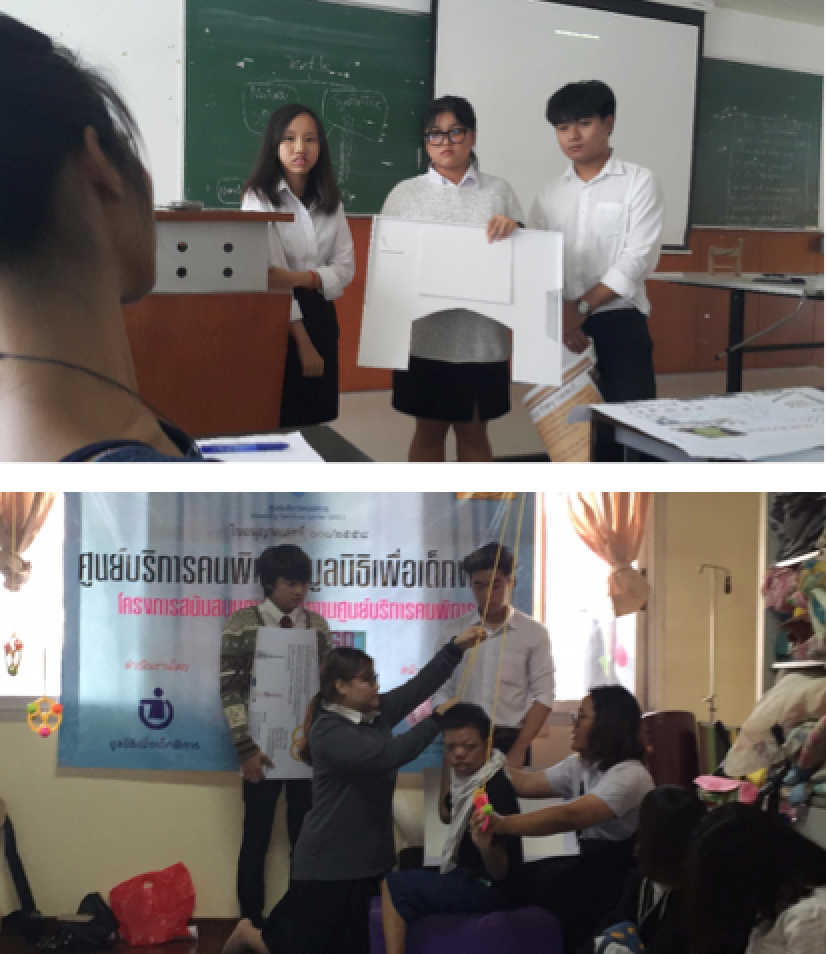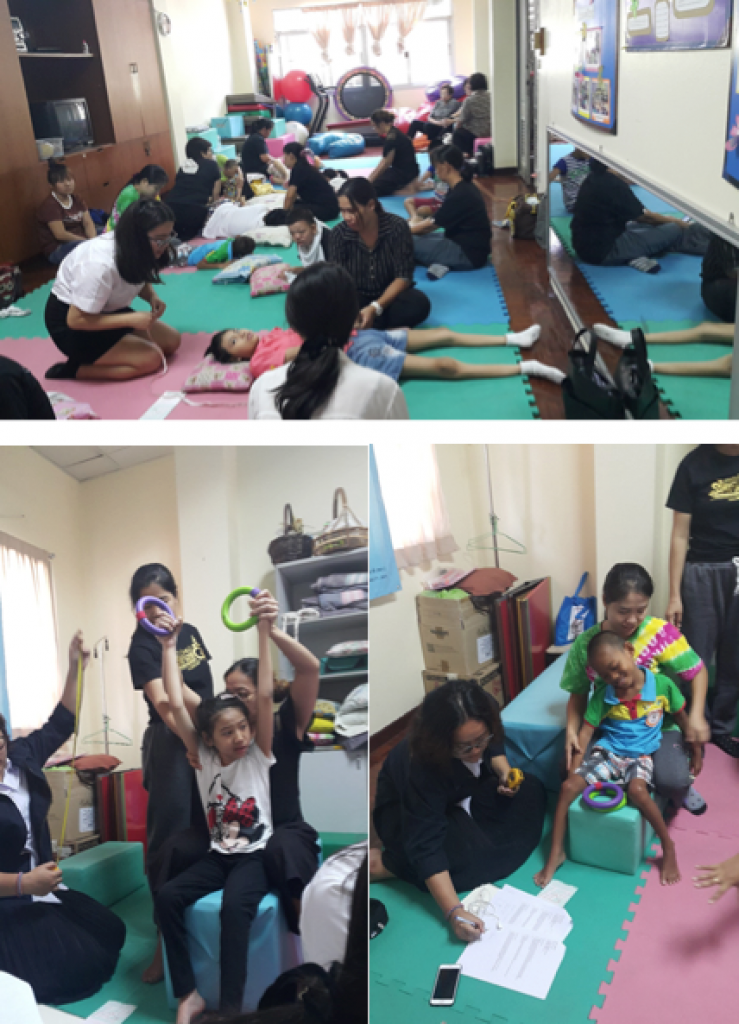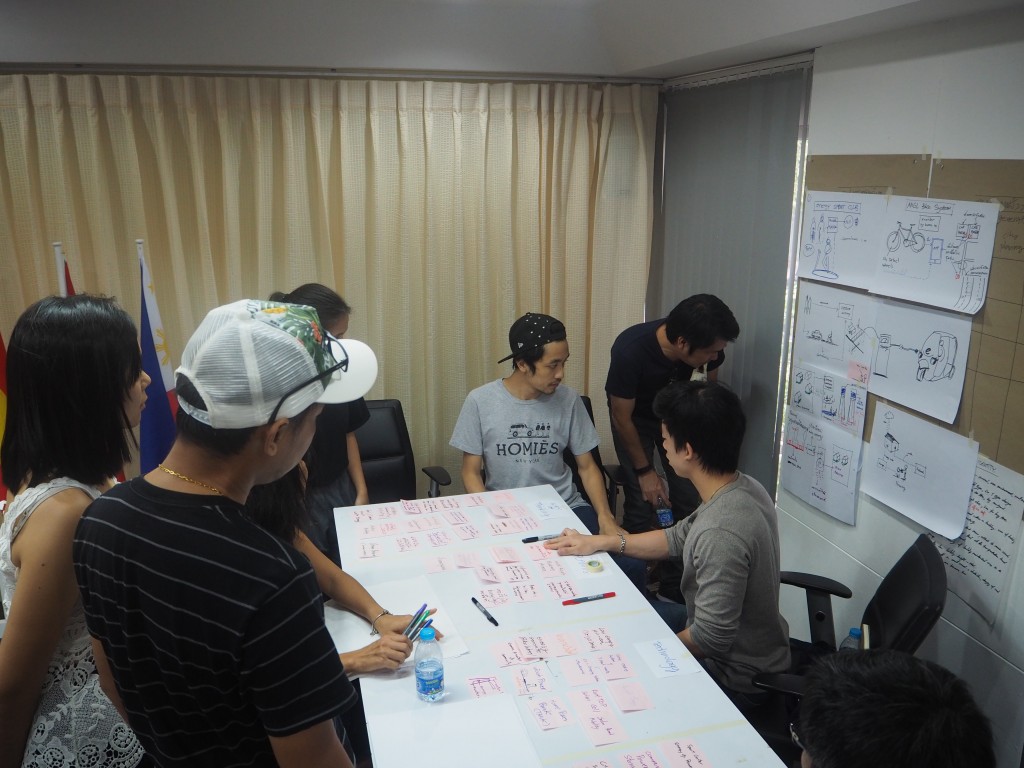Project: Vibe Yard The Artisan Hub Co-working and hotel by Alus Na Talang
Award: 2nd winner Thesis of the year 2017 by TIDA (Thailand Interior designer Association)
The ‘Universal Design research and academic service
Participants: Students and faculty in IND 2102 Human Factors class. Interior Design Program.
Venue: Foundation of Disabilities Children
Date: Academic Year 2016, Oct 1st 2016 – March 24th 2017.
Status : 95% done (updating document and upload to Foundation of Disabilities website)
Design Program : 4 challenging design tasks ( 4 student groups)
1. A productive tray: for improve live standard for children with SMA (State 2)
2. A bath chair : for improve live standard for children with SMA (State 4)
3. A slider : for improve children with SMA’ movement and practice body strength
4. A gymnastic ring : for improve children with SMA’ movement and practice body strength
Project objective:
KM Strategy 1: Improve AAU undergraduate students by providing intensive learning through using practical methods and integrating with teaching and learning especially in enhancing presentation skills, which is necessary in architecture and design discipline.
The program included with three phases;
Phase # 1 : Participatory research phase with parents and expert teacher.
Students and all participants have exchanged and developed their design knowledge, skills, and experiences on many key discussion issues. Initiate project from UD needs and immerse to learning by research from real case at Foundation of Children with Disabilities.
Measure 1: Students acquire all basis behavior and problems from each case study individually.
Student understand human body character and movement and limitation of each case study.
The special lecture on “SMA” children from Foundation expert about SMA symptom and its characters at the foundation.
Phase # 2 : Design phase
Expert teacher and parents gave objective and requirement for student to design an efficient equipment or furniture to solve problem in each case study individually.
Measure 2: The discussion on UD design challenge along 4 weeks period process bring up new efficient design equipment or furniture work as prototype for public. All design has been tested by children and revised to fit user’s objective.
Phase # 3 : Design for as-built guideline brochure
This as-built guideline brochure will be provided on the foundation’s website for parent who are interested on the equipment can re-built it by using the information provided.
Measure 3: Design a suitable as-built brochure for website for public announcement .
In summary, student in this class has acknowledged on universal design aspects and how to apply design work to increase living standard for specific user “children with SMA symptom”. All participants; students, lecturer, children with SMA symptom, parents, caretaker, teacher, social service officer and the foundation staff have exchanged and developed their design knowledge, skills, and experiences on the key discussion issues. Last, the brochures will be posted on the foundation website to promote to public as guideline for parents, caretaker and anyone who are interested. 


Product Design Department of AU Montfort del Rosario School of Architecture and Design, has been selected to take part in the University-Industry Collaboration Project with Casio Computer Co., Ltd. and Chiba University with eleven AU product design students chosen to work with Casio Design Center’s Chief Designer, Yukihiko Ida and Associate Professor Kenta Ono. Six students from Division of Design Science, Graduate School of Engineering, Chiba University, also joined in this project which runs from October, 2016 to June, 2017. Such mission features the workshops and TV conferencing for collaboration of students from both universities to develop the new products for Casio Computer, Japan. The workshops are being guided by a team of Casio designers. AU Product Design students will be sponsored to present their final works at Casio Computer’s Headquarters in Japan. The collaboration aims to exchange academic knowledge and industry know-how to the benefit of product design education and profession.
In 2017 is the 4 th anniversary of international workshop and academic partnership in cooperation with Wismar University of Applied Sciences, Germany and Faculty of Landscape Sciences and Geomatics, Neubrandenburg University of Applied Sciences, Germany, and Montfort del Rosario School of Architecture and Design, Assumption University of Thailand (AAU) as hosts the international workshop in topic “Hyper Bamboo| Kinetic Façade” from 4th to 14th July 2017.
Participants are including under-graduate, post-graduate students 48 students and 10 professors. The international workshop aims to deliver subject-related knowledge in bamboo facade design focusing on movable architectural elements/flexible space concept. Discussions and impulses during the workshop will include the integration of local material (bamboo) to create an economical, flexible, and sustainable architecture. Students will get the opportunity to experiment, develop and prototype their own design and learn to solve all unforeseen problem in actual constructions. The activities are also responsible for arranging the lecturers, a block seminar, excursions and hand on workshops.
For more information please visit: https://www.facebook.com/

The academic service program of ‘Smart City Development for Ari Community’ for Academic Year 2016 in Phaya Thai District, Bangkok from Oct 1st, 2016 – March 24th 2017, has given our students a better understanding and knowledge of sustainable urban development in many aspects. The students’ achieved an essential knowledge in ‘Smart City Development’ as well as other aspects in design, including high quality livable spaces, landscape design, and an efficiency in urban design to create an efficient energy consumption. All the workshop’s participants have exchanged and developed their design knowledge, skills, and experiences on the key discussion issues regarding smart city criteria that provided by Thailand Ministry of Energy and Thailand Green Building Institute. Satisfaction workshops were conducted in Phaya Thai District Office and Pa Thai Urban Redevelopment Center Office between our faculty members, students, and the experts from many organizations, including the local community residents.
The task for the workshop has challenged the students in many aspects in term of sustainable urban development and creative architectural design to promote smart city urban development concept. The first part of the project, faculty members and students were working according to the criteria set in the Smart City. This criteria includes: Smart Energy, Smart Mobility, Smart Community, Smart Environment, Smart Economy, Smart Building, Smart Governance, and Smart Innovation. The students were divided into these eight groups according to the criteria and work with experts in the field to derive with the development proposal in each category. Another important task for the team is the development direction which has to address the issue of ‘community identity’. This will lead to the proposal of all categories in the smart city.
At the workshops, students were divided into groups, which had mixture of students, lecturers, experts, and local community residents. Team leaders in each category were helping instruct and advise each team. During the workshops, all instructors and students were also surveying Phaya Thai District area to collect and analyze data for their works.
At the end of the workshop 1st session, each team has proposed their concept approach for Smart City concept of Ari Community proposal with identity in relation to the given problematic issues.
Youtube: https://www.youtube.com/watch?feature=share&v=92_PQBcH_oM&app=desktop
Faculty member(s):
Mr. JATURONT BOONLA-OR
Assoc. Prof. Dr. NITICHAN PLUEMAROM
Dr. SANPHAWAT JATUPATWARANGKUL
Mr. BENJARIT NIMBOONCHAJ
Dr. LE THI THU HUONG
Ms. PRIMA VIRIYAVADHANA
Mr. VEERA LEELAPATTANAPUTI
Mr. SUPARATH VALAISATHIEN
Mr. VASIN THAMMANUBAN
Mr. SOMSAK JIDMON
Mr. VITTVAT CHAROENPONG
Assist. Prof. NOBPADOL SUVACHANANONDA
Participated Student(s):
Ms. PANNWADEE CINDY CHEVALLEY
Ms. ANYARIN MARINVIMOL
Ms. KITTIVARA UNCHANSASTR
Mr. KONGKHAM LUANGKHOT
Mr. PHON CHULAKASYENA
Ms. RATTANAWADEE WONGWORACHART
Ms. PAPHITCHAYA SUKKASEM
Mr. SANTI PRAPAVAT
Ms. JIRAWAN HONGSRI
Mr. SITTIPON MONGKHOLMEUNG
Mr. YUNYU HUANG
Ms. WIPHAWEE KHOOAROON
Mr. THANAKORN KHAMRUM
Mr. PRARATHTAKORN PHETCHAWONG
Ms. WANDILE ROSE SIBANDA
Ms. PONGCHAN MAIYARAT
Mr. JAROON TIPPARAT
Ms. NITTHA WUTTIBENJAPOLCHAI
Mr. SASIN SRISAMANUWAT
Mr. MONG SHYANG TAN
Mr. NUTTAWUT PIMPRAPOTE
Ms. KARMA MINJUR SELDEN
Ms. NATNICHA CHUSANGSOOK
Mr. PUNTAKARN WIRUTPUN
Mr. THANADPONG MAIPIYA
Ms. SONAM PELDON
Ms. JEERAPORN YENBUMRUNG
Ms. MANEE THANARAK
Ms. PREMKAMON BURAKITPHACHAI
Ms. SAWITA AREEROB
Mr. JULIO FERNANDES PINTO
Mr. PANICH LAOTHEERASIRI
Ms. PATTARANIT MCINTYRE
Ms. NANTIKANT PREECHAPIRIYA
Mr. APITHORN CHURNTHAWORN
Mr. ELISIO FRANCISCO AMARAL DE SA
Mr. ANGKOON TENGHATTAKORN
Ms. CHOMPUNUCH PUENGPANWUTH
Mr. PASCAL PONGCHINDA
Mr. KRITSADIT CHAROENSUB
Ms. PAWEESAYA PITTAYATARATORN
Ms. THANWARIN SAKUNCHAROENRAT
Ms. PORNPUN TESSANABOON
Mr. ISLAM MAMEDEV
Mr. WARAT M.
Objective(s)
1) To survey and conduct research on certain aspects in Smart City concept of Ari Community, Phaya-Thai district, Bangkok
2) To propose a new implementation for urban infrastructure and urban planning of Ari Community and to develop the new system and design for the area .
3) To link with cultural and social background and define the community’s identity.
Goal(s):
(1) To provide knowledge on the energy conservation, energy efficiency, and energy management.
(2) To provide knowledge on the concept of energy sustainability and management to building sector, community sector, and urban environment sector.
(3) To provide knowledge and enhance design skill for students about advance urban and architectural designs.
(4) To provide opportunity for students to work and collaborate with multiple professional discipline in the economic, environment, cultures, and social issues.
(5) To provide opportunity for alternative strategy of teaching and learning.
(6) To provide academic service for the community.
Result(s):